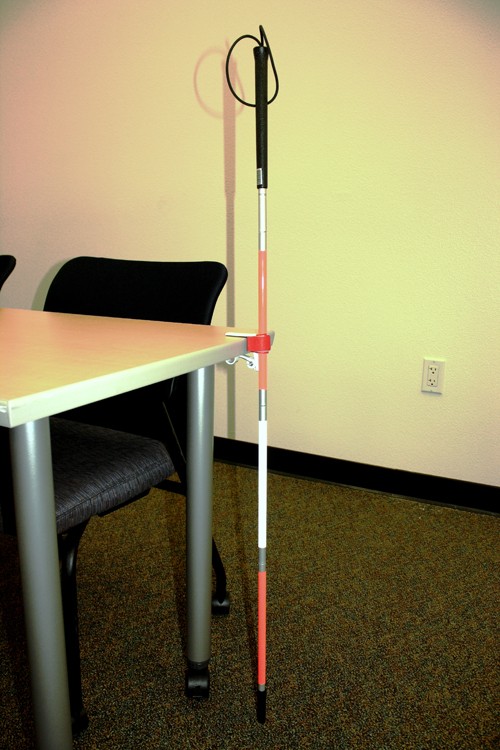CLU team is semifinalist in design contest
M.S. students to show cane clip for blind in Baltimore

Graduate students designed a small clip that can be attached to a cane and used to hold it next to a desk or table.
(THOUSAND OAKS, Calif. – June 14, 2012) California Lutheran University students are semifinalists in an international design competition aimed at moving innovative products for people with disabilities to market. The graduate students developed a device to prevent walking canes used by people with visual impairments from falling to the floor when they aren’t in use.
Jane Hankins of Canoga Park and Jennifer Black of Granada Hills are receiving an all-expense-paid trip to present the CLU Clip at the Rehabilitation Engineering & Assistive Technology Society of North America 2012 Annual Conference from June 28 through July 3 in Baltimore. They and representatives of the nine other Student Design Competition semifinalists, including Duke University and the University of North Carolina at Chapel Hill, will meet with assistive-technology developers.
Five finalists will be announced at the conference. The team with the product deemed most likely to become commercially available will receive $500 and an opportunity for one member to spend three weeks working with staff at the Center for the Translation of Rehabilitation Engineering Advances and Technology in New Hampshire to move it toward the marketplace.
Hankins uses a cane for support, as do her sister and mother, so she knows first-hand the tendency of canes to fall and cause tripping hazards. The longer, lighter canes used by the blind are even more prone to falling, and people with visual impairments are more likely to trip over them.
As part of a class assignment, Hankins wanted to help a deaf and blind fourth-grader who had been mainstreamed into a regular classroom. His teacher told him to leave his cane at the door before taking his seat at the front of the classroom so that it wouldn’t be a tripping hazard. His parents were concerned that he would not be able to get his cane quickly in an emergency. When Hankins could not find a product to hold his cane at his desk, she asked her classmates to help her devise a simple, portable, low-cost solution and submit it for the Student Design Competition.
The graduate students in CLU’s deaf and hard-of-hearing program designed a small clip that can be attached to a cane and used to hold it next to a desk or table. Students from the Alaska State School for Deaf and Hard of Hearing, South Carolina Commission for the Blind, and Virginia Department of the Blind and Visually Impaired tested the clip and gave it rave reviews.
RESNA is a professional organization dedicated to promoting the health and well-being of people with disabilities through increasing access to technology solutions. For more than 30 years, the Student Design Competition has showcased creative and innovative assistive technology designs that help people with disabilities function more independently. Student teams represent a wide variety of disciplines including mechanical, electrical and biomedical engineering; computer information science; architecture; and physical and occupational therapy.
For more information on the CLU Clip, go to cluclip.net.